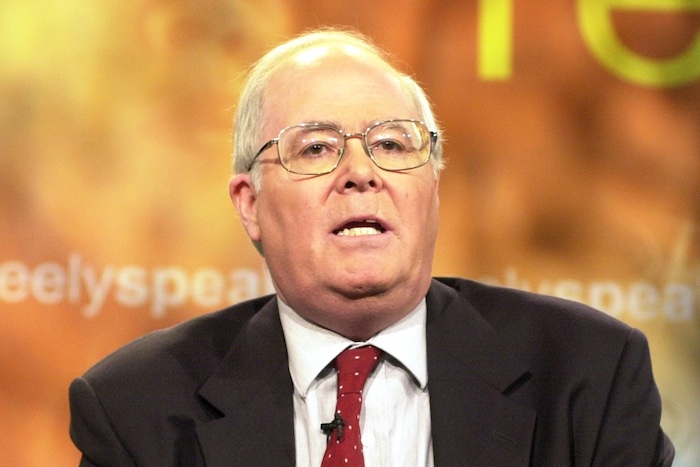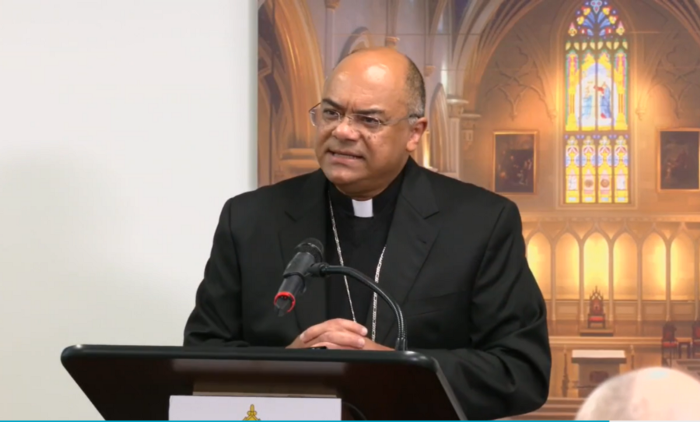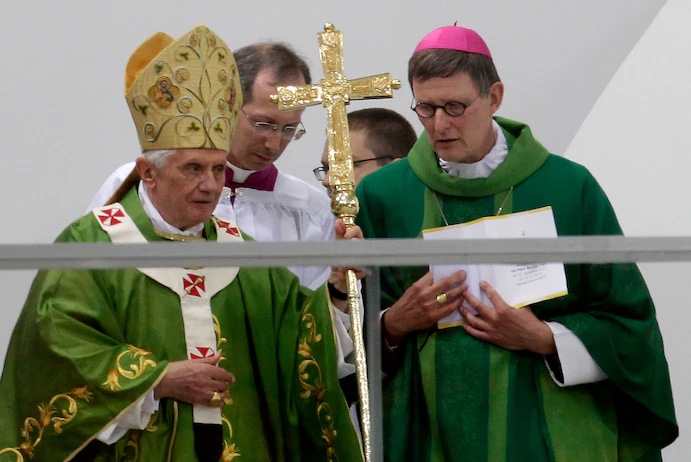Benedict XVI’s supporters believe attacks on the emeritus pope’s handling of sexual abuse while archbishop of Munich are aimed at reinforcing progressive views on sexuality and priestly celibacy.

Supporters of Pope Emeritus Benedict XVI rose to his defense in the past week after a report on decades of sexual abuse in his former archdiocese in Munich accused the retired pontiff of covering up and ignoring abuse by Catholic priests there.
But some believe the defense of Benedict is less about his legacy and more about the deepening polarization in the Catholic Church and its approach to homosexuality and priestly celibacy, issues that are both now center stage in Germany.
“I don’t think the report is going to change the mind of people either way” when it comes to Benedict, said Bill Donohue, longtime president of the Catholic League, a conservative watchdog and promoter of the church.
Benedict “is hated by the Catholic left because he is the one who really enforced the Scriptures of the Catholic Church as the head of the Congregation for the Doctrine of Faith,” said Donahue, referring to the prelate’s tenure during the papacy of St. John Paul II as an enforcer of Catholic dogma, when then-Cardinal Joseph Ratzinger earned the title “God’s Rottweiler.”
“The impending schism in Germany is far more serious than this,” said Donahue, who called himself proud to be called “the Rottweiler’s Rottweiler.”
A report from the Archdiocese of Munich and Freising, published Jan. 10, found that bishops who oversaw the diocese between 1945 and 2019, including Ratzinger, failed to punish clergy and laypeople who committed sexual abuse.
More importantly for many Catholics, however, is the movement in the wider German church that has involved the country’s Catholics in wide-ranging discussions of the most pressing issues facing the institution, including sexual abuse, for nearly three years. The “Synodal Path,” as the discussions are known, followed a 2018 report that scandalized Catholics in the country when it found more than 37,000 cases of clerical abuse in Germany over the span of 68 years, leading to a massive exodus of faithful.
The Synodal Path discussions ended in early February under the shadow of the revelations from Munich. Even after Benedict responded contritely to the accusations, German Catholics felt “disappointed,” said Claudia Lücking-Michel, vice president of the Central Committee for German Catholics and a delegate to the Synodal Path.
While the Synodal Path addresses a wide array of topics facing the local church, including female ordination and power structures, the question of homosexuality “is currently at the very center of public discussion,” Lücking said.
The report, she said, “was the last drop that made the cup overflow.”
While many Germans identify clericalism — the abuse of power by Catholic clergy — as the main culprit for the church’s systemic failure to respond to sexual abuse, some Catholic conservatives blame the presence of homosexuals in the church.
“We have a homosexual scandal here, not a pedophilia scandal,” Donohue said. “Clericalism may have something to do with why some bishops were enabled, but it has nothing to do with why a man would put his hands on a minor.”
Equating homosexuality with pedophilia is strongly contested in the Synodal Path discussions, according to Lücking. “Homosexuality has nothing to do with pedophilia,” she said.
While the majority of Catholics in Western countries agree that homosexuality should be accepted in society, the question of homosexuality and priestly celibacy is more controversial in Eastern Europe, Africa and the Middle East. As the Vatican struggles to adapt church teaching with modern understanding of sex and sexuality, the issue has the power to tear the global church apart.
“This report and the entire sexual abuse scandal, a sad page for the church in Germany, is being exploited to bring about a new church,” said the Rev. Maurice Ashley Agbaw-Ebai, a Catholic priest from Cameroon who teaches theology and philosophy at Boston College.
According to Agbaw-Ebai, who wrote his dissertation on Benedict, the Munich report offered Benedict’s detractors “their pound of flesh” and strengthened the position of those who want to push Catholic doctrine toward the demands of modernity.
Germany’s Synodal Path is the surest sign of that push. On Feb. 5, its plenary assembly approved four documents proposing a “reevaluation of homosexuality” and challenging Catholic doctrine forbidding female ordination and requiring priestly celibacy.
“The synod has changed,” Lücking said, “you can feel the difference at the plenary. There are more and more bishops saying we have to act, we have to change, there is no other way out of the crisis.”
On Feb. 3, the current archbishop of Munich and Freising, Cardinal Reinhard Marx, supported a renewed study on priestly celibacy and told the German daily Sueddeutsche Zeitung, “For some priests, it would be better if they were married.”
Cardinal Jean Claude Hollerich, archbishop of Luxembourg, meanwhile, has proposed that the church’s teaching on homosexuality “is no longer correct.” Hollerich has been named by Pope Francis to oversee the Synod on Synodality, a self-examination of church practices underway in dioceses around the world that will conclude with a summit at the Vatican in 2023.
The concern for Catholic conservatives is that the progressive stance of German prelates will influence Francis’ ambitious reform efforts for the church as a whole.
In Germany “you have a rebellion going on,” Donohue said. “This synod process that is going to go forward is an open invitation for people to exploit any friction in the Catholic Church,” he said, adding that progressive Catholics “will use Benedict as another weapon in their arsenal.”
But Agbaw-Ebai contends that “what is happening in Germany is clearly a result of the actions and statements of today’s Vatican,” pointing to Francis’ willingness to engage with the Catholic LGBTQ community early in his pontificate.
The pope’s position on this issue, however, has been ambiguous. During a closed-door meeting with Italian prelates in May 2018, Francis suggested that bishops should “keep an eye” on homosexual tendencies in people entering the seminary, stating that “if in doubt, better not let them enter.”
Francis’ words seemed to echo a 2005 document published by Benedict stating that people with “deep-seated” homosexual tendencies should be barred from entering the priesthood.
Donohue agrees that the pope, despite his outreach to LGBTQ Catholics, has done little to change the official Catholic position and has put a firm halt to requests for female ordination and the blessing of same-sex couples. “It’s one thing to be pastoral, it’s another to change the doctrine,” Donohue said.
He said he buys Benedict’s prediction that the church is destined to shrink to a small group of true believers. It’s unlikely that conservative Catholics will be the ones to leave, he said, unless the Vatican embraces “radical teachings” like those discussed in Germany. He blames the Vatican for allowing the German Synodal Path to “raise people’s expectations in a regrettable way.”
For Lücking, if the Vatican doesn’t take the proposals of the Synodal Path, then “the Catholic Church in Germany will become a minority, a sect,” but she said she still harbors “the illusion” that what is happening in Germany may still clear the path for progress.
“It might not be tomorrow, or the day after tomorrow, but it will happen one day,” she said.
Complete Article ↪HERE↩!




